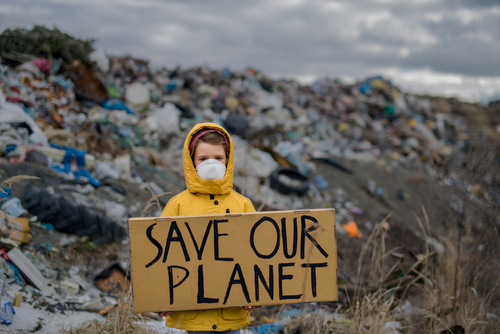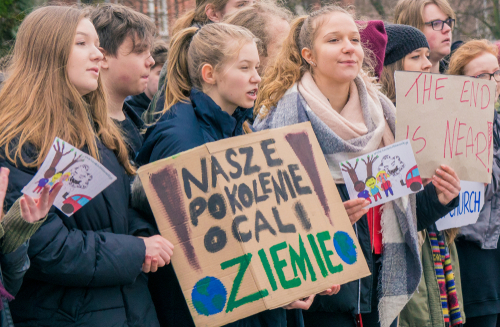 The European Union will spend the coming years on ever more serious disputes over the climate and environment and the implementation of the idea of the European Green Deal. The progressing global warming and related policies will affect the economy, society, and public debate. The still-increasing global emissions of carbon dioxide will encourage discussions on the effectiveness of current global climate policies. In turn, these rely mainly on fiscal mechanisms such as emission trading systems will become an increasing burden on society, especially in those countries that still have emission-related electricity systems. One such country is Poland.
The European Union will spend the coming years on ever more serious disputes over the climate and environment and the implementation of the idea of the European Green Deal. The progressing global warming and related policies will affect the economy, society, and public debate. The still-increasing global emissions of carbon dioxide will encourage discussions on the effectiveness of current global climate policies. In turn, these rely mainly on fiscal mechanisms such as emission trading systems will become an increasing burden on society, especially in those countries that still have emission-related electricity systems. One such country is Poland.
The right-wing government, which has been ruling the Vistula since 2015, has mostly been conservative towards the issue of energy transformation. The ruling party's politicians were somewhat interested in preserving the existing system in this sector (based on the monoculture of coal units). Due to this kind of lapses, the initiative in environmental issues was taken over by left-wing and liberal groups in Poland.
Despite the change in society's knowledge of the climate and the environment and pressure from the European Union, still a large part of the conservative right wing - political, media and social - apparently does not intend to compete with the left wing in this field. Instead, many traditional journalists and opinion leaders focus on questioning the achievements of science in assessing the anthropogenic climate change, which - with the current state of knowledge - mainly boils down to dealing with sophisticated rhetorical disputes and flipping over long-denied fake news.
This problem is evident in the context of relations with the young generation of Poles. This generation is characterized by a high level of environmental sensitivity and awareness - while the political right-wing lacks people with the same worldview. This means that in the coming years, the potential of right-wing parties to attract new, younger voters will decrease. There is more and more a common language, principles, and goals in the relationship between the right wing and the new generation of Poles.
Such an attitude of Polish right-wingers is harmful for several reasons - first of all, it leaves the left-wing postulates practically without a substantive counterattack. And second, it is a distortion of what the conservative right wing should be. There is nothing to prevent this side of the political scene from being greener. Not only that - care for the climate and the environment are elements that are even integrated into the conservative worldview.
The figure of Pope Francis and his encyclical Laudato si cannot be ignored in these considerations. In this document - a warning to a broader concern for the environment - you can find, among others, criticism of the internationalization of environmental costs, which hit poorer countries, for example, in terms of reducing emissions. According to the Pope, the richer ones who earned their money from burning fossil fuels have incurred environmental debt and should now support poorer countries in the energy transition.
 The famous British philosopher Sir Roger Scruton also wrote about Green Conservatism in his book "Green Philosophy" about the modern possibilities of forming the so-called famous British philosopher. The fact that the first-ever emissions trading system was established in Reagan's America, at the initiative of conservatives, can be seen as a manifestation of the implementation of the assumptions of this worldview.
The famous British philosopher Sir Roger Scruton also wrote about Green Conservatism in his book "Green Philosophy" about the modern possibilities of forming the so-called famous British philosopher. The fact that the first-ever emissions trading system was established in Reagan's America, at the initiative of conservatives, can be seen as a manifestation of the implementation of the assumptions of this worldview.
 So why is the conservative right wing in Poland so reluctant to see environmental issues? This is due to the formation of society over the past half-century. Poland and other countries of the Soviet bloc were not affected by the oil crisis of 1973 and subsequent ones, and it was these events that contributed to the rapid development of environmental awareness and eco-activism in Western countries. Besides, coal still plays a strategically important role in the Polish economy - its importance has decreased over the last 30 years. However, it is still a raw material from which we obtain over 80% of our electricity, and the mining sector employs tens of thousands of people. Looking at ecology from this perspective, we see a relatively new, historically unrooted movement that strikes at resources that have a reputation as a national good. This must provoke a reaction, most often emotional.
So why is the conservative right wing in Poland so reluctant to see environmental issues? This is due to the formation of society over the past half-century. Poland and other countries of the Soviet bloc were not affected by the oil crisis of 1973 and subsequent ones, and it was these events that contributed to the rapid development of environmental awareness and eco-activism in Western countries. Besides, coal still plays a strategically important role in the Polish economy - its importance has decreased over the last 30 years. However, it is still a raw material from which we obtain over 80% of our electricity, and the mining sector employs tens of thousands of people. Looking at ecology from this perspective, we see a relatively new, historically unrooted movement that strikes at resources that have a reputation as a national good. This must provoke a reaction, most often emotional.
Moreover, the broad ecological movement came to Poland relatively recently, together with discussions about the new shape of the family, the role of the Church in the state and society, and the rights and privileges of minorities. Thus, the climate and the environment's issues have been instinctively woven by the right wing into a large block of postulates associated with the left. The stereotype of an eco-activist was created, into which the postulates directly hitting the system of conservative values, i.e., the institution of the family, property, freedom, and protection of life, were incorporated. The right-wing tries its best to perpetuate this image, forgetting, however, that it has under its wings; environmentally sensitive people, without being supporters of abortion or same-sex relationships. The impression is established that it is not appropriate for a conservative to deal with the climate or the environment - and thus, this field is given away practically without a fight from the left.
 This state of debate is catastrophic. Not only are the demands of the left wing in the ecological field uncontrolled in terms of content by the right wing, but there is also a side effect in the form of an unjust and unauthorized transfer of the dispute to the - entirely fictional - sphere of the Church vs science, which reinforces the syndrome of a besieged fortress in the conservatives. Yet, through the centuries of its existence, the Church was the organization that supported and developed science.
This state of debate is catastrophic. Not only are the demands of the left wing in the ecological field uncontrolled in terms of content by the right wing, but there is also a side effect in the form of an unjust and unauthorized transfer of the dispute to the - entirely fictional - sphere of the Church vs science, which reinforces the syndrome of a besieged fortress in the conservatives. Yet, through the centuries of its existence, the Church was the organization that supported and developed science.
Considering the above, a thesis can be made that if the Polish (but not only) conservative right wing does not leave this blind, climatic street into which it entered, it will be considered a break in history in this field in retrospect. Global warming and the accompanying climate change will not retreat in the face of articles accusing them of leftism. They can be slowed down in several ways - unfortunately, currently, only those presented by the left operate in the public space.
Therefore, it is worth appealing to the currently formed right-wing conservative government to find a green wing in its policy. The climate and the environment are already issues that bring voices in Poland. There is no solid right-wing position in the domestic debate on these topics. Without an appropriate programme in this regard, Warsaw will find it increasingly difficult to push for itself in the European arena. Why, then, sacrifice these values without fighting under the spirit of your worldview?
Author: Jakub Wiech, deputy editor-in-chief of Energetyka24
The TOGETAIR editorial team prepared the title and subtitles.